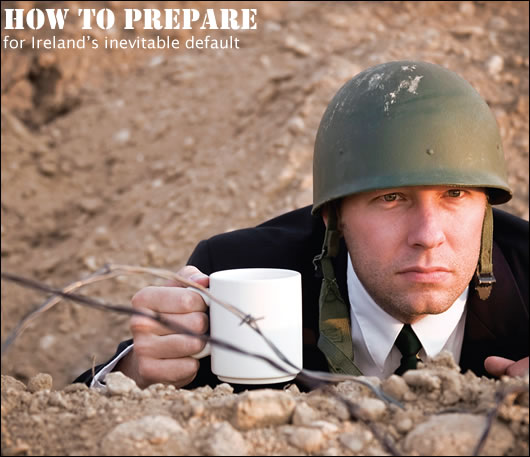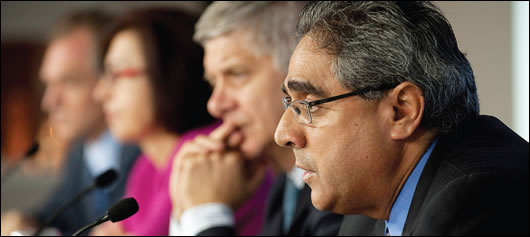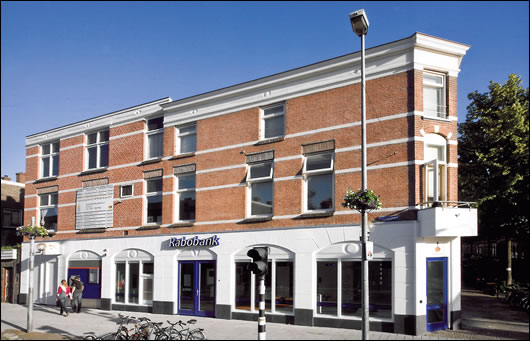- Economy
- Posted
Ireland's inevitable default

Richard Douthwaite explains why the bailout may turn out to be a gift to Ireland, and offers some advice for dealing with a default.
Taken at face value, the EU/IMF bailout deal seems to add insult to an already severely injured Irish economy, as a consensus of left, right and green-leading experts have gloomily concurred. Richard Douthwaite explains why the bailout may turn out to be a gift to Ireland, and offers some advice for dealing with a default.
A friend of mine refuses to get upset about the high rate of interest, 5.8%, being charged on Ireland's €67.5 billion bailout loan. Indeed, it is the very fact that the interest is so high that eases his mind. “Ireland cannot average a 5.8% rate of growth each year for the next few years and it is consequently going to get deeper in debt. Everyone involved in the bailout negotiations knew that,” he says.
He believes that all the loan is expected to do is to buy time before either Ireland defaults or a solution is found to the debt problems afflicting every single eurozone member state. As Germany's insistence on monetary orthodoxy makes the latter outcome most unlikely, he concludes that everyone close to the action tacitly accepts that Ireland will have to default. This would involve writing off a large chunk of the bailout loan. In other words – and this is what pleases my friend – far from our having to pay too much interest, a lot of the money we are getting will turn out to be a gift.
It only takes a quick look at the figures to see what the ECB and IMF negotiators saw – that the massive amount that people living in Ireland and the Irish state owe makes a default inevitable. Irish households owe the banks €138 billion. The state owes €157 billion if you add the national debt, €88.6 billion at the end of November, to the debts for which the state is responsible because organisations like Nama have taken them on.
In other words, the people of Ireland owe a total of €295 billion either personally or collectively. This total excludes company debts despite the fact that we have to service them in the prices we pay. Dr Constantin Gurdgiev, who compiled these figures from official data, points out that there were just over a million taxpayers in Ireland before the net was widened in last month's budget. As a result, each of these taxpayers was having to support a debt of €280,648.

Dr Constantin Gurdgiev - Ireland's inevitable default
Put another way, each man woman and child living in Ireland owes around €66,000 at present and this will rise to €81,500 when all the €67.5 billion in bailout money is drawn down. If the 5.8% rate of interest charged for the bailout was applied to all that debt, each of us would need to find €3,860 every year just to cover the current interest cost and this would rise to €4,725 at the end of the bailout period.
In 2009 – the most recent year for which official figures are available – the national income per person was €29,431, down from €37,532 two years earlier. This means that the current interest charge, €3,860, already swallows up 13% of our average income. The percentage could rise to 16% when all the bailout fund has been drawn down provided that our incomes stay about the same and are not reduced by the swinging government cuts. A recent Ernst and Young forecast expects our incomes to fall.
On top of these annual interest charges we have to pay the cost of keeping the country running. This is currently about €55 billion a year or €12,360 per head after deducting interest charges as we are tracking these separately. Even if this amount can be brought down by a further 10% over the next three years, it means that 54% of everyone's income will either be going to pay interest or for government services at the end of the bailout period compared with the 41% being taken at present. I do not believe that it will be politically possible to raise taxes by a third above their present level.
From an economic point of view, the real cost of our debt does not depend on the rate of interest but on how much of that interest leaves the country. (Interest paid by borrowers in Ireland to lenders in Ireland involves no net cost to the country.) One of the big mistakes of the Tiger years was that the government allowed the banks to borrow from abroad with the result that they now owe around €100 billion overseas. Of this, €34bn came from German banks, €31bn from British banks, $19bn from US banks, and €16bn from French banks. The Irish banks also owe €136.4bn to the European Central Bank so their total foreign debt stands at €236bn.
Fortunately, as much as €207bn of this could be offset by claims the Irish banks have against foreign banks. If that is the case, the banks' net foreign debt is probably around €30 billion. To this we must add the foreign component of the national debt – around €70 billion. Collectively, then, the people and the state have a net foreign debt of €100 billion on which several billion euros extra in interest will have to be paid to lenders overseas in future because, in view of the risk of default, the rate they are charging has gone up.
Ireland's foreign earnings may be inadequate to make this extra payment possible. During the second quarter of 2010, roughly €1.14bn more left the country to pay for imports, interest and the profits that foreign firms send to their head offices, than were earned from exports and interest and profit payments running the other way. The results were better in the third quarter – a quarter of a billion flowed in, the first surplus since 2003 – but the net outflow for the first nine months of the year was still €2.5bn. So our foreign earnings need to increase considerably. Unless they do, any rise in external payments either leaves less money in circulation here, making doing business more difficult and causing the economy to contract, or requires Ireland to borrow more from abroad. And any borrowing from anywhere to pay interest is a pretty bad idea.
Servicing our debts is therefore almost certainly politically and economically impossible. The country will struggle on, its national income falling and its budget deficit rising even though it is making cut after cut in vital areas. None of its politicians will have the guts to call a halt to this impoverishment process and the best and the brightest of our young people will leave. It will be a wonderful relief when outsiders eventually cause the default to happen.
But if a default is inevitable, why is Ireland being paid, via the bailout money, not to default now? The answer is clear. A default now would mean that the foreign banks and other institutions which have lent to Ireland would suffer massive losses and might need to be rescued by the governments of the countries in which they are based. Big firms with deposits in Irish banks in excess of the €100,000 state guarantee would suffer big losses too. Indeed, if the two major banks collapsed, the government could find itself unable to honour its deposit guarantees at all.
So the bailout strategy is designed to buy enough time to give foreigners the chance to get their money out of Ireland before the default occurs. Once this has happened, the debts on which Ireland defaults will be largely to the IMF, the European Central Bank and other public multinational sources whose money is replacing the funds which the private investors and depositors take out. In other words, just as Irish politicians forced the Irish taxpayer to bail out the private Irish banks, European politicians are forcing taxpayers in Europe and elsewhere to inject money into Ireland to allow foreign banks and multinational companies to escape from the consequences of their mistaken Irish investments.

Ajai Chopra, deputy director of the IMF's European department, who led the bailout team. An IMF staff report issued after they left Ireland actually anticipates a banking crisis
The scandalised refusal of the bailout negotiators to entertain the idea that Ireland should “burn the bondholders” to reduce the Irish banks' debts must be seen in this light. And the principle that private money must be protected also explains why ECB money was injected into the banks to enable them to repay €70 billion to bondholders during the two-year bank deposit guarantee period which ended in September.
If a default is inevitable and the outside world is preparing for it, how should we in Ireland prepare for it too? My guess is that the default will be triggered by the banking sector as this would be more politically-acceptable than coming from the state itself. It could happen like this. The bailout money is not being given upfront. It will come in quarterly instalments provided agreed targets are met. One day, when the outside world reckons that the private sector is reasonably ready, the ECB will suddenly announce that the banks' performance has been dismal because of their increasing number of non-performing mortgages and other loans and that it is not going to continue to inject any more money into them.
An IMF staff report issued after its bailout team had left Ireland actually anticipates a banking crisis: “There are significant risks […] that could affect Ireland’s capacity to repay the Fund [...]. A prolonged period of deep recession could weaken loan repayment capacity of households and businesses and increase bank losses beyond current projections, leading the economy into a negative spiral. Analogously, wage and price deflation—coupled with contraction in activity—could have a powerful negative effect on debt dynamics.”
The report also warns that the government's cuts could make its budgetary situation worse. “The fiscal outlook might deteriorate, opening a larger financing need,” It states. “The side effects of the adjustment could [...] lead to sharp reductions in tax revenue.” Moreover, reversing the financial sector deterioration might be difficult and, the report warns, “there is also a real risk of a disorderly disruption of financial pressures,” whatever that means.
If the ECB refused to put more money into the u banks itself and ordered its Dublin office, the Central Bank, not to do so either, the government would be unable to keep the banks open. This would be because it would have used up its own resources in the National Pension Reserve Fund by this time. (Did you notice that the bailout deal stipulated that pension fund money had to be used up first?) Those running the IMF/ECB/EU bailout would tell the government that they would only release enough money to allow the banks to re-open after a general debt write-down had been agreed and that Irish debts must be written down too. “The Irish must take some punishment as well,” they are likely to say.
Such a write-down could involve the international organisations writing off perhaps half the money they have advanced on condition that loans and deposits with Irish banks are written down by 50% as well. So, if I had had €10,000 in my bank account on the day the banks were forced to close, I would only have €5,000 there when they re-opened in a form which I could use immediately. The rest would have been frozen. On the other hand, half of my mortgage or any other loans I had would have been frozen too, provided that they were with institutions covered by the state guarantee.
The frozen part of people's bank deposits could become “post-crisis” credits modelled on the post war credits that Britain issued during World War II. If this course was followed, the holders of post-crisis credits would be told that their credits would be redeemed over a period of years once the crisis was over and that their value on redemption would be based on how much the economy had grown or shrunk during the period since they were issued. When the redemption of the post-crisis credits began. those whose debts had been frozen would be asked to begin to repay an amount that had, like the credits, been adjusted to take account of the economy's performance.
Cutting the country's debt burden in this way would get tens of thousands of people out of negative equity and make their remaining debts much easier to pay. This would strengthen the banks. Naturally, the people who had had half their bank deposits frozen for an indefinite period would be very upset but at least they would be left with the other half of their money, more than they might have got without state intervention.
So, back to my question. If you think that an Irish default is going to be internal as well as external and that domestic debts are going to be written down, here's what you could do to prepare.
1. Keep as much money as you can in cash. No-one can say how long the banks will stay closed before a solution is worked out and, in any case, you can't have part of your money frozen if it's hidden somewhere around your house. Ask yourself the question “Where is my money safer these days – in a bad-debt-ridden bank or in a floor safe at home?” Remember that private pensions and other interest-based payments are likely to dry up for a period and then resume at a much lower rate.
2. Your local supermarket is likely to run short of supplies for a few days until the banking system is restored. Imported goods will be worst affected. So make sure you have a good stock of the basics on your kitchen shelves. Petrol, diesel and bottled gas might become scarce too.
3. If you have an account with Bank of Ireland or AIB, just leave a small amount there so that your regular payments can continue to be made in the run-up to the default. If you decide not to keep all the rest in cash, transfer the remainder to a bank which does not have a registered office in Ireland. The Ulster Bank and National Irish Bank will not do as they have a registered offices in the state and thus come under the sweeping provisions of the new Credit Institutions Stabilisation Act, which allow the Minister for Finance to do almost anything he likes. RaboDirect is the obvious option but so many people are opening accounts there at present that you need to allow at least three weeks before your account is operational. A lot of money has been transferred to the Post Office recently because deposits there have a direct state guarantee and people reckon that even if the banks close temporarily, the post offices will stay open. I'm not so sure about that myself. You could open a credit card account with a non-Irish bank and put a lump sum into it so that you are nicely in credit. This should allow you to get cash abroad even if the ATM network closes here. Other payments might continue to be possible.
4. Opening a bank account outside Ireland is tricky even though EU rules state that an EU resident should be able to open an account in any EU country. Go for a non-euro currency. Swedish bank accounts are notoriously hard for non-Swedes to open even if you have a tax registration number there. Barclays is the only British bank I have been able to trace that is prepared to open accounts for Irish residents but doing so takes time and they probably won't be interested unless you can deposit a largish amount. You can download the forms to print out and complete, posting them off with utility bills and a certified copy of your passport.
5. Don't buy gold. I say this because, when you need to sell it, other people will be wanting to sell it too and its price will fall sharply, Remember that during the crisis itself people will have more important things to do with their money than buying gold from you and that in the post-crisis world there will be less money around to pay you for it. In any case, once the crisis is over, far fewer people will feel that the level of uncertainty is so great that they still need to buy the metal. It was a different matter in the past when having a gold coin or two sewn into the hem of your coat could make all the difference when fleeing from an invading army, but who in a chaotic situation today is going to give you very much for a one-ounce Krugerrand, which you'd currently have to pay €1,091 to obtain?

A lot of people are putting their money into RaboDirect, the online banking arm of the Dutch Rabobank. A non-euro currency is a safer option but opening a bank account outside Ireland is tricky even though an EU resident should be able to open an account in any EU country
As we all know, because the property bubble wasted resources by putting up more buildings than were required, it led to a huge financial loss. The present crisis is essentially a battle to decide who should bear that loss. The trouble is, for as long as the battle goes on, more resources will be wasted – particularly people's working lives. So I don't feel it's irresponsible of me to suggest that we should take our money out of the Irish banks because our doing so will hastens the day on which the crisis is brought to an end.
The banks' problem – which they share with a lot of banks in the richer parts of the world – is that the amount of credit they extended to their customers is out of sync with their customers' current incomes. The balance between debts and incomes can be restored in only two ways. One is the way I've just discussed – to write off a lot of the debt or, as a minimum, to put a large chunk of it into cold storage. The other is to use a combination of inflation and enabling more people to find work to raise incomes by enough to support the debt burden.
The latter is the course I'd prefer but putting more people to work and having an inflation is not something that Ireland can organise on its own now it no longer has its own currency. As things stand, the increase-incomes solution requires either a massive rise in exports or an influx of debt-free money from the ECB. Neither is likely to happen before a default is forced on us. So a debt write-down – a partial jubilee to use the biblical term – is the only rebalancing method likely to be available.
The results of the rebalancing would be pretty good for anyone owning property because, with the banks stabilised and people's capacity to borrow restored, the market could begin to function again. True, the prices on that market would be perhaps half what they were at the 2008 peak but that fall has happened already and the rebalancing should not make prices any worse. Prospective purchasers would be very cautious – and especially so if a site value tax was introduced. However, their caution would be no bad thing from a national point of view, because we no longer want people piling into property in search of speculative gains. Any new investment boom must be in the renewable energy or energy-saving areas and a working property market could help bring the latter about because it should enable people to be sure that whatever they spend on improving their properties' energy ratings they would be likely to be able to recoup when they put their buildings on the market. All in all, while it would be a huge shock at the time, a rebalancing would give us what we all want – the chance to make a fresh start.

